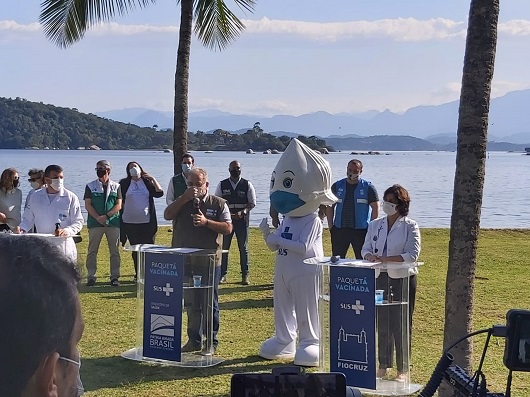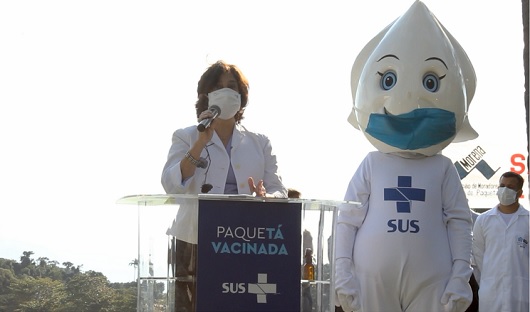Fiocruz participates in COVID-19 vaccination in the Paquetá island
23/06/2021
Municipal Health Secretary (SMS, in the Portuguese acronym)
Last Sunday (June 20), the Municipality of Rio de Janeiro vaccinated the entire eligible population of the island of Paquetá (those above 18 years of age), including pregnant women, against Covid-19. The PaqueTá Vacinada project (Paquetá Is Vaccinated, in loose translation) by the Municipal Health Secretary (SMS) aims to evaluate the effects of large-scale vaccination on the island’s population and was approved by the Ethics Committees in Research of the municipal government and of the Ministry of Health (MS). Kick-started in the morning, the event was attended by the Ministry of Health, Marcelo Queiroga; the municipal secretary of Health, Daniel Soranz; and Fiocruz president, Nísia Trindade. The event was also graced with the presence of Fiocruz pneumologist and researcher Margareth Dalcolmo; Rodrigo Toledo sub-mayor of the islands; Mário Sérgio Ribeiro, state subsecretary of Surveillance and Primary Healthcare; and municipal subsecretaries of Environment, Eduardo Cavaliere, and Social Welfare, Laura Carneiro.
In his speech, the municipal Secretary of Health, Daniel Soranz, thanked the compliance of the island’s inhabitants. It involved the testing of 2,759 inhabitants between Thursday and Saturday, including 421 children, of which 21% showed previous exposure to the coronavirus.
“This is a very sad moment. We have reached 500,000 deaths in Brazil, and we are all very sorry. This is a deeply sad moment of grief, but it is also the time for hope and for an attempt to rebuild a new future. We hope this future arrives early to Paquetá. We expect this region to be a symbol for the entire country and to show the effects of mass vaccination on people’s lives. We were hoping between 20 and 30% of the population would comply with blood collection, but 70% complied with the research”, he said.
Minister Marcelo Queiroga highlighted the importance of mass vaccination in Paquetá as a test of the vaccine’s efficacy against the new variants, among other aspects. “In addition to the Fiocruz vaccines, we have other types approved by the National Agency of Surveillance in Public Health [Anvisa]. Three of them have already been given a definitive registration, while another has been accepted on an emergency basis. They all do what they are expected to do and are all useful in the fight against COVID-19. This study carried out here, in Paquetá, shows the Ministry of Health’s commitment to the research. We already know that these vaccines approved by Anvisa are safe and effective. But we still need to understand other aspects regarding effectiveness; we must analyze the effectiveness of these vaccines against other variants”, says the Ministry.
Fiocruz president, Nísia Trindade, considers vaccination in Paquetá crucial for scientific studies. “A fundamental research to evaluate the impact of vaccines that Fiocruz has delivered to our Unified Health System [SUS] with much commitment and responsibility. Fiocruz is very honored to participate in an initiative built jointly with the Municipal Government of Rio de Janeiro, with the Municipal Secretary of Health, and with the Ministry of Health’s National Vaccination Program”, Trindade said.
Ministry Marcelo Queiroga vaccinated the very first person on the island, writer Conceição Campos, 50. “A wonderful sensation”, according to Campos, who has lived in Paquetá since 2008. “We had been looking forward to this day. The island’s adhesion to the campaign was very impressive and it will help with Fiocruz’s research”, she said.
The second person to be vaccinated, Audenise Ana Ferreira, also 50, makes a living transporting tourists in one of the many electrical vehicles in the streets of Paquetá. She now finally feels a little safer. “I have been at serious risk of getting sick during the pandemic because I work with tourists. I am pure happiness now. I could barely sleep last night, I was so anxious”, she stated. She has lived on the island for 33 years.
Study
The island’s population fully embraced the study, run by the Municipal Secretary of health with the support of Fiocruz. During the three days of the campaign, 70% of the inhabitants showed up at the testing stations, where they also responded to the epidemiological questionnaire. About 200 health professionals and volunteers worked with the population each day.
Children and teenagers were given fast tests, while those above 18 had their blood collected for serological testing. The blood samples were taken to Fiocruz, where they will be analyzed in the laboratory, by helicopter. Over 12 months, the locals will be monitored and part of them will be asked to repeat the tests to follow and measure antibodies acquired after the first and second dose of the vaccine.
The island’s population will be followed up to evaluate the safety of the vaccine and how mass vaccination also protects non-vaccinated people, such as children and adolescents. The study will also observe whether the first dose of the vaccine will be able to prevent transmission of cases in the region or if this is only possible after the second dose, to be applied after at least 8 weeks.
Paquetá has a population of 4,180 inhabitants registered in the Family Health Strategy, of which 3,530 are above 18 years of age. Up to Saturday (June 1st), according to the entire municipality’s calendar, 1,971 first doses (D1) had already been administered among the local population, as well as 1,344 second doses (D2). Last Sunday, the entire remaining eligible population received the AstraZeneca vaccine. The island’s 17 pregnant women were given CoronaVac, according to a recommendation of the Ministry of Health for this target public. Only the resident population was vaccinated during this campaign, according to the registries of the Family Health Strategy. Tourists were not allowed to be vaccinated.
The campaign on the island during the week boasted the participation of volunteers such as college students and other people working for the NGO Core (Community Organized Relief Effort), a humanitarian initiative that works in different countries and during this pandemic has helped increase access to vaccination. The entity’s investments on the Municipality of Rio de Janeiro to fight Covid-19, as support to the Unified Health System, are focused on setting up vaccination and testing stations and on hiring professionals.




